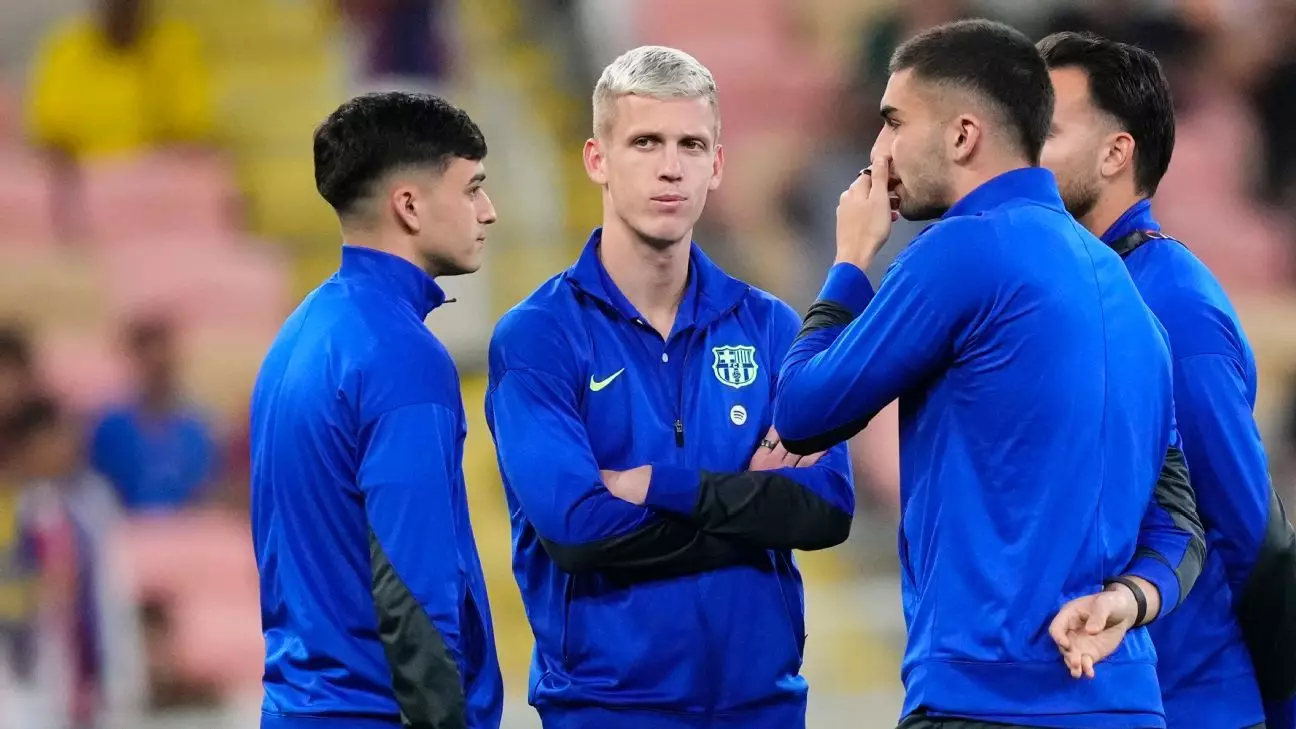The recent approval of temporary playing registrations for Dani Olmo and Pau Víctor has ignited a storm of criticism against Barcelona from rival club Athletic Club. The circumstances surrounding this decision highlight deeper issues in Spanish football, namely the discrepancies in regulations and their implementation across different clubs. As revelations about the bureaucratic tangles that have brought both clubs and their fanbases to this moment continue to emerge, one can’t help but question the integrity of the system that governs LaLiga.
Barcelona’s trouble began when the club failed to meet a crucial deadline on December 31 to demonstrate compliance with LaLiga’s financial fair play rules. This situation rendered the club unable to register new players for the ongoing season. The Royal Spanish Football Federation (RFEF) and LaLiga’s denial meant that any additions to Barcelonas squad would have to wait until clear evidence of financial stability was presented. However, in a surprising turn of events, the Spanish Sports Council (CSD) intervened and granted permission for Olmo and Víctor to participate in matches before a final ruling could be made.
This conflict illustrates a duality in the approaches to compliance within Spanish football. Barcelona’s long-standing financial troubles, particularly stemming from the COVID-19 pandemic and the fallout from the club’s previous management decisions, reveal systemic weaknesses. Yet, the quick intervention of the CSD raises questions about the fairness of the processes involved, leading to allegations of preferential treatment for certain clubs over others.
Reactions from Athletic Club: A Voice of Dissent
Athletic Club president Jon Uriarte did not hold back in expressing his outrage, referring to the situation as “grotesque.” In his comments, he criticized the juxtaposition of leagues encouraging clubs to invest and grow while simultaneously allowing a club like Barcelona to circumvent established registration procedures. His statement that “this situation cannot happen because it is very bad for football” resonates with fans and rival clubs who advocate for a level playing field.
Uriarte’s remarks were echoed by Athletic forward Iñaki Williams, who articulated concerns that the integrity of Spanish football might suffer due to perceived inequalities in how the regulations are applied. Williams suggested that while the players might be delighted for the opportunity to play, the larger implications for the league cannot be ignored. This sentiment reflects a growing discontent in Spanish football regarding the consistency of rule enforcement.
In the wake of this criticism, Barcelona’s sporting director Deco offered a defense of the club’s actions, emphasizing that all clubs face their own challenges and should manage them internally. Deco’s assertion that the decision to grant temporary registrations was made by governing bodies suggests an underlying confidence in the legitimacy of the CSD’s ruling. It highlights a contentious divide between those who feel that established regulations should apply strictly and consistently versus those who believe exceptions may be justified under specific circumstances.
Furthermore, the players at the center of this controversy, Dani Olmo and Pau Víctor, have become pawns in a larger chess game of football politics, as they simply seek to play. The emotional toll on players unable to participate in matches due to administrative issues is often overlooked in these discussions, adding a layer of human complexity to the corporate machinations of football.
The Role of LaLiga and Governance Bodies
LaLiga president Javier Tebas added an additional layer to the discourse by expressing his astonishment at the CSD’s decision. His criticism directed towards other football entities, particularly Real Madrid TV’s “complicit silence,” suggests internal fracturing within the league itself regarding this incident. Tebas’ comments echo a sentiment that there needs to be accountability in the decision-making processes at the highest levels, ensuring that all clubs are treated equitably.
As Olmo and Víctor prepare to play in the upcoming Supercopa final, the implications of these events linger. Questions about the very fabric of governing structures in Spanish football have emerged, indicating a profound need for reform. The irony that these players’ availability will be decided in part by bureaucratic maneuvering speaks volumes about the tangled relationships between clubs, governing bodies, and the sporting integrity at stake.
The issue of player registrations in Spanish football is not merely about compliance with financial rules—it is emblematic of larger systemic issues within the sport that require careful examination and, ultimately, reformation to safeguard its true competitive spirit.

